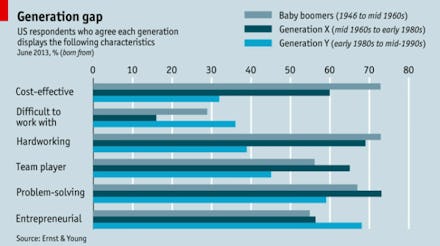Are 20-Somethings Better Workers Than Their Parents? Check This Chart

One of the ever-burning questions about millennials is whether or not we deserve the stereotype that we're lazy and entitled. This often comes down to clashes with our parental generation, the baby boomers. A recent YouTube satire tackled this question with hilarious results. Now, a chart from Ernst & Young featured in the Economist attempts to add empirical data to the mix. Some baby boomers may take a quick look and raise their arms in victory, but further analysis actually empowers millennials. Luckily, this millennial wasn't too lazy to put this piece together.
This chart compares the three largest generations working today — the baby-boomers, generation X, and the millennials of generation Y — in terms of work characteristics. These characteristics ideally form the composite worker for each generation,including being "cost effective," "easy to work with," "hard-working," a "team player," good at "problem solving," and "entrepreneurial."
Here's what the chart said. Much to the validation of the baby boomers, their generation led in being cost-effective and hard-working. Millennials were found to be the least cost-effective, most difficult to work with, least hardworking, least likely to be team players, and the least adept at problem-solving. Generation X actually proved the best in all categories except at being cost-effective, where they were second and closer to the baby boomers.
Breaking this down, two traits on this chart seem to promote the millennial stigma. The largest gaps are between being cost-effective and hardworking. To the credit of the millennials, we actually beat out the baby-boomers on being entrepreneurial.
Let's toss generation X for a second (we'll get back to them). What are the implications for the millennial stigma? Well, baby boomers may keep saying that generation Y is lazy and entitled, but entrepreneurial affinity might be the most relevant for our globalized world. Looking at problem-solving, baby boomers aren't beating millennials by much. Consider the age gap. The narrator notes that the age gap in experience factors into being cost-effective. The same goes for problem-solving, favoring the millennials more. As millennials age, their cost-effectiveness will rise, but so will their problem-solving.
What we can surmise from this is that baby boomers are cost-effective and hardworking, with average numbers in the other traits. But when millennials reach the age of baby boomers, they will be entrepreneurial problem-solvers with average numbers in other traits.
What are the implications for the millennial stigma? Millennials get the brunt of criticism right now because they don't reflect the same type of workers as previous generations. But being different is better and necessary if the workplace changes. This is to say that millennials are probably better suited for the workplace of the future. In fact, many of the jobs that baby boomers had no longer exist in the U.S.
Generation X might be the best because they have the best parts of the baby boomers and the millennials. While they had baby boomers as role models, generation X was also able to navigate shifts in globalization and technology.
Millennials were born in an era where adaption is trumping hard work. Hit with a recession, millennials stayed in school and are now the most educated generation with 63% of the demographic having a bachelor's degree, according to Forbes. Should it be a huge surprise that millennials lead in being entrepreneurial?
It's time to end the millennial stigma, baby boomers. The world has been changing and the future workplace made up of generations X and Y might be the most effective for making America more competitive in the global market — even if you don't understand HBO's Girls. Give millennials a few more years, and a few less cases of student debt. We'll be there.